Related Research Articles

Recycling is the process of converting waste materials into new materials and objects. This concept often includes the recovery of energy from waste materials. The recyclability of a material depends on its ability to reacquire the properties it had in its original state. It is an alternative to "conventional" waste disposal that can save material and help lower greenhouse gas emissions. It can also prevent the waste of potentially useful materials and reduce the consumption of fresh raw materials, reducing energy use, air pollution and water pollution.
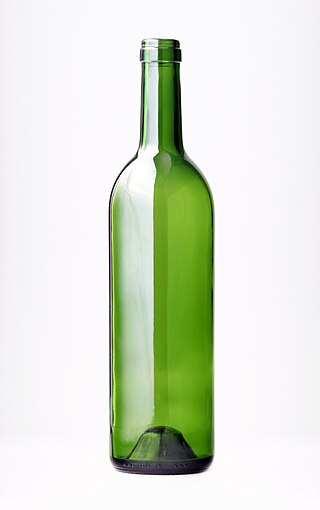
A bottle is a narrow-necked container made of an impermeable material in various shapes and sizes that stores and transports liquids. Its mouth, at the bottling line, can be sealed with an internal stopper, an external bottle cap, a closure, or induction sealing.

Polyethylene terephthalate (or poly(ethylene terephthalate), PET, PETE, or the obsolete PETP or PET-P), is the most common thermoplastic polymer resin of the polyester family and is used in fibres for clothing, containers for liquids and foods, and thermoforming for manufacturing, and in combination with glass fibre for engineering resins.
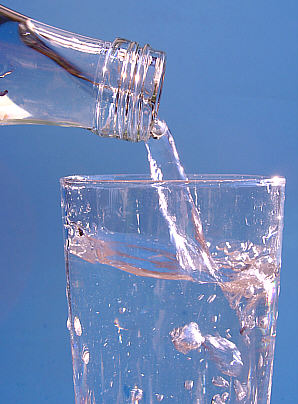
Bottled water is drinking water packaged in plastic or glass water bottles. Bottled water may be carbonated or not. Sizes range from small single serving bottles to large carboys for water coolers.

A reusable bottle is a bottle that can be reused, as in the case as by the original bottler or by end-use consumers. Reusable bottles have grown in popularity by consumers for both environmental and health safety reasons. Reusable bottles are one example of reusable packaging.
Dasani is an American based brand of bottled water created by the Coca-Cola Company, launched in 1999. It is one of many brands of Coca-Cola bottled water sold around the world. The product is filtered and bottled.

A steel can, tin can, tin, steel packaging, or can is a container for the distribution or storage of goods, made of thin metal. Many cans require opening by cutting the "end" open; others have removable covers. They can store a broad variety of contents: food, beverages, oil, chemicals, etc. Steel cans are made of tinplate or of tin-free steel. In some dialects, even aluminium cans are called "tin cans".

Although PET is used in several applications,, as of 2022 only bottles are collected at a substantial scale. The main motivations have been either cost reduction or recycle content of retail goods. An increasing amount is recycled back into bottles, the rest goes into fibres, film, thermoformed packaging and strapping. After sorting, cleaning and grinding, 'bottle flake' is obtained, which is then processed by either:

Container-deposit legislation is any law that requires the collection of a monetary deposit on beverage containers at the point of sale and/or the payment of refund value to the consumers. When the container is returned to an authorized redemption center, or retailer in some jurisdictions, the deposit is partly or fully refunded to the redeemer. It is a deposit-refund system.

A water bottle is a container that is used to hold liquids, mainly water, for the purpose of transporting a drink while travelling or while otherwise away from a supply of potable water.
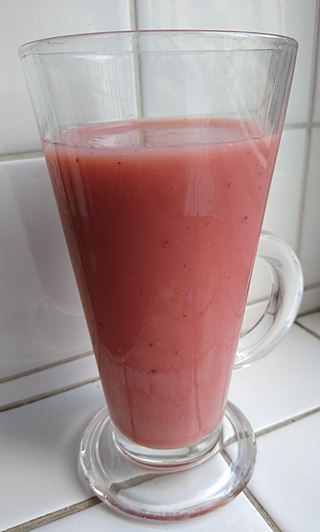
Innocent Drinks is a British-based company that produces smoothies and juice sold in supermarkets, coffee shops and various other outlets. The company sells more than two million smoothies per week. Innocent is over 90% owned by The Coca-Cola Company.
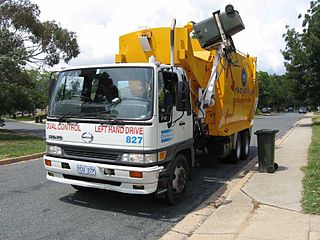
Kerbside collection or curbside collection is a service provided to households, typically in urban and suburban areas, of collecting and disposing of household waste and recyclables. It is usually accomplished by personnel using specially built vehicles to pick up household waste in containers that are acceptable to, or prescribed by, the municipality and are placed on the kerb.

SM Jaleel & Company Ltd, also known as SMJ, is the largest manufacturer of non alcoholic drinks in the English speaking Caribbean. Since inception in 1924 their portfolio of beverages are distributed to over 60 countries worldwide.

A plastic bottle is a bottle constructed from high-density or low density plastic. Plastic bottles are typically used to store liquids such as water, soft drinks, motor oil, cooking oil, medicine, shampoo, milk, and ink. The size ranges from very small bottles to large carboys. Consumer blow molded containers often have integral handles or are shaped to facilitate grasping.
Bottles are able to be recycled and this is generally a positive option. Bottles are collected via kerbside collection or returned using a bottle deposit system. Currently just over half of plastic bottles are recycled globally. About 1 million plastic bottles are bought around the world every minute and only about 50% are recycled.
Bottled water bans have been proposed and enacted in several municipalities and campuses everywhere over such concerns as resource wastage, transportation emissions, plastic litter, and damage to affected aquifers.
Ice River Springs is a private label bottled water producer for retailers and food service operators and manufacturer of the Ice River Green brand of bottled water. The company runs a plastic recycling operation, Blue Mountain Plastics (BMP), that takes bottles collected by municipalities and produces food grade recycled PETE for its water bottles. As of 2020, the company was headquartered in Shelburne, Ontario. The recycling facility was also located in Shelburne and its nearest bottling plant was in Feversham, Ontario, 40km away. Its operations included locations across Canada and the Ice River Hialeah Gardens subsidiary in Florida, USA.
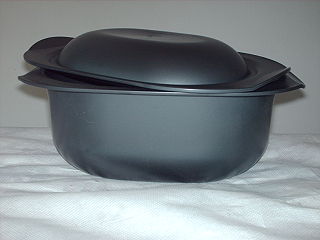
Plastic containers are containers made exclusively or partially of plastic. Plastic containers are ubiquitous either as single-use or reuseable/durable plastic cups, plastic bottles, plastic bags, foam food containers, Tupperware, plastic tubes, clamshells, cosmetic containers, up to intermediate bulk containers and various types of containers made of corrugated plastic. The entire packaging industry heavily depends on plastic containers or containers with some plastic content, besides paperboard and other materials. Food storage nowadays relies mainly on plastic food storage containers.

Packaging waste, the part of the waste that consists of packaging and packaging material, is a major part of the total global waste, and the major part of the packaging waste consists of single-use plastic food packaging, a hallmark of throwaway culture. Notable examples for which the need for regulation was recognized early, are "containers of liquids for human consumption", i.e. plastic bottles and the like. In Europe, the Germans top the list of packaging waste producers with more than 220 kilos of packaging per capita.

Closed Loop Box Reuse, is the process by which boxes or other containers are reused many times. It is a form of reusable packaging.
References
- ↑ Stevenson, Seth (19 June 2012). "Why Are Poland Spring Bottles So Crinkly? They Used To Be Much Sturdier". Slate Magazine. Retrieved 13 November 2019.
- ↑ Carlon, John (17 July 2017). "Thinner bottles make for worse PET recyclate, says Plastic Recyclers Europe". British Plastics and Rubber. Retrieved 13 November 2019.
- ↑ Next Big Thing Award home page